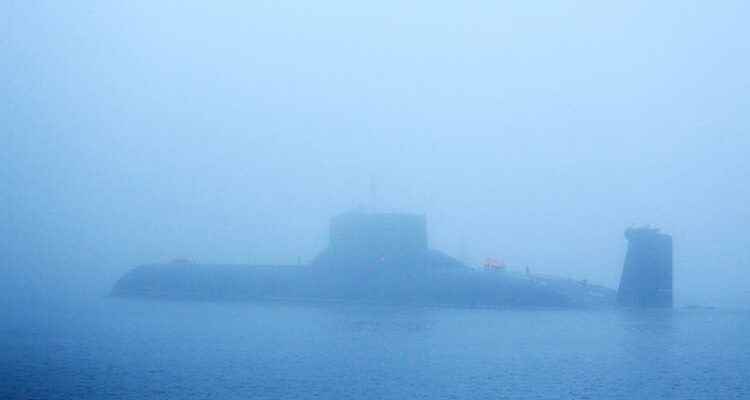Although they are contractually entitled to do so, the US is no longer allowed to control Moscow’s nuclear weapons. The reasons for this are flimsy.
It may soon be unclear how many are in Russian hands: a nuclear submarine near St. Petersburg.
The Russian Foreign Ministry published a short statement on Monday evening communique with potentially major consequences: for the time being, no American inspectors are allowed to inspect the Russian nuclear arsenals. The inspections were granted to each other by the two largest nuclear powers in the world in the New Start disarmament agreement, which was extended in 2021.
In the treaty originally concluded in 2010, the two countries agreed to further limit their strategic nuclear weapons. They undertook to reduce their corresponding arsenals to a maximum of 1,550 nuclear warheads, 800 launch pads and 700 delivery systems (ICBMs and strategic bombers) each. They also agreed to a regular exchange of data on the number and locations of their nuclear weapons.
Even without the suspended inspections, the US and Russia continue to exchange data about their nuclear arsenals. But for both sides to trust this data, Russia and the US are allowed to inspect each other’s nuclear arsenals up to 18 times a year. However, there have been no inspections since March 2020 due to the corona pandemic.
In order to prevent a possible resumption of mutual controls, Russia has now announced that it will suspend the inspections. The Foreign Ministry cited Western sanctions as the reason. Because of the punitive measures against Russian planes, inspectors can no longer travel to the United States. If controls were resumed, the American side would have an unfair advantage. The corona pandemic is given as the second reason: Due to the high number of cases in the USA, the safety and health of Russian inspectors cannot be guaranteed.
Is Russia breaking the treaty?
The Russian side refers to a passage in the agreement which states that inspections may be suspended in exceptional circumstances. At the same time, Russia emphasizes that it wants to continue cooperation with the USA and that the measures now taken are only temporary.
Oliver Thränert, head of the think tank at the Center for Security Studies at ETH Zurich, therefore does not assume that New Start has died: “Russia has suspended part of the contract until further notice, but has not said goodbye to the entire agreement .» In addition, in the current situation, both governments have no interest in interpreting the suspension of the controls as a termination of the contract. “Russia and the US want to hold onto the straw of the last existing nuclear arms control agreement.”
However, Thränert considers the reasons given by Moscow to be false. He is not aware of any case in which Russian inspectors could not have entered the United States. “The suspension of inspections does not mean a complete exit from nuclear arms control. Moscow wants to somehow retaliate against the Western sanctions and at the same time show that it is playing on an equal footing with the Americans on nuclear issues,” says the nuclear weapons expert. “Russia is pursuing a clear tactic: it is spreading insecurity and a lack of transparency without completely slamming the door.”
Global arms control is in jeopardy
Nevertheless, with Moscow’s step, global nuclear arms control has become weaker. The USA and Russia are still the countries with the largest nuclear arsenals. Without inspections, an important element of confidence-building and transparency is missing at a time when Russian-US relations are at a new low.
Russia’s blocking of inspections could further strain relations. Even if the New Start agreement is saved, it will definitely expire in 2026 and cannot be renewed again then.
Thränert is skeptical that there will be a new treaty in a few years: “Unfortunately, at the moment I see no signs of negotiations about, let alone the implementation of, new arms control agreements.” There are too many points of contention between the Russians and the Americans for that. In addition, the American Senate would have to ratify such an agreement with a two-thirds majority. In view of the political polarization in the USA, this is questionable.
Already, Russia’s suspension of inspections has weakened the agreement. If there were no longer an agreement, other nuclear powers such as China or India could also increase their nuclear armament. The world could become even more insecure as a result, says Thränert: “If the USA and Russia were no longer committed to mutual nuclear arms control, the international regime for the non-proliferation of nuclear bombs would be weakened even more than it already is.”
